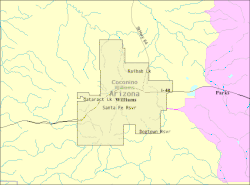Williams, Arizona
| Williams, Arizona | |
|---|---|
| City | |
| City of Williams | |

Steam locomotive and train sitting at Williams Depot, 2006
|
|
| Nickname(s): Gateway to the Grand Canyon | |
 Location in Coconino County and the state of Arizona |
|
 U.S. Census Map |
|
| Location in the United States | |
| Coordinates: 35°14′58″N 112°11′24″W / 35.24944°N 112.19000°WCoordinates: 35°14′58″N 112°11′24″W / 35.24944°N 112.19000°W | |
| Country | United States |
| State | Arizona |
| County | Coconino |
| Settled | 1881 |
| Incorporated | July 9, 1901 |
| Government | |
| • Type | Council-Manager |
| • Body | Williams City Council |
| • Mayor | John Moore |
| Area | |
| • Total | 43.8 sq mi (113.4 km2) |
| • Land | 43.5 sq mi (112.7 km2) |
| • Water | 0.3 sq mi (0.8 km2) |
| Elevation | 6,766 ft (2,062 m) |
| Population (2010) | |
| • Total | 3,023 |
| • Estimate (2014) | 3,094 |
| • Density | 69/sq mi (27/km2) |
| Time zone | MST (UTC-7) |
| ZIP code | 86046 |
| Area code | 928 |
| FIPS code | 04-83160 |
| Website | City of Williams |
Williams (Havasupai: Wii Gvʼul) is a city in Coconino County, Arizona, west of Flagstaff. Its population was 3,023 at the 2010 census. It lies on the route of Historic Route 66, Interstate 40, and the Southwest Chief Amtrak train route. It is also the southern terminus of the Grand Canyon Railway, which takes visitors to Grand Canyon Village. There are numerous inns, motels, restaurants and gas stations that cater to the large influx of tourists rather than local residents, especially during the summer and holiday seasons.
Also known as the "Gateway to the Grand Canyon", Williams was the last town on Historic Route 66 to be bypassed by Interstate 40. The community, bypassed on Oct. 13, 1984, continues to thrive on tourism. Boasting seven area fishing lakes, hiking trails up Bill Williams Mountain and into Sycamore Canyon, an alpine ski area and cross country ski trails, four seasons weather and an abundance of wildlife, Williams offers unlimited recreational opportunities for the outdoor enthusiast.
The Historic Downtown District covers six square blocks. The town boasts a rich heritage that features the Old West and Route 66, coupled with tourism trends today and the town's heyday years of the '50s and '60s.
Williams is named after William "Old Bill" Williams, a mountain man and trader who often trapped in the area.
Founded in 1881, Williams was named for the famous trapper, scout and mountain man, "Old Bill Williams." A statue of "Old Bill" stands in Monument Park, located on the west side of the city. The large mountain directly south of town is named Bill Williams Mountain and the Town was incorporated July 9, 1901.
Williams was the last town to have its section of Route 66 bypassed, due to lawsuits that kept the last section of Interstate 40 in Arizona from being built around the town. After settlements called for the state to build three Williams exits, the suits were dropped and I-40 was completed. On October 13, 1984, Interstate 40 was opened around the town and newspapers the next day reported the essential end of US 66. The following year, Route 66 was decommissioned.
...
Wikipedia

